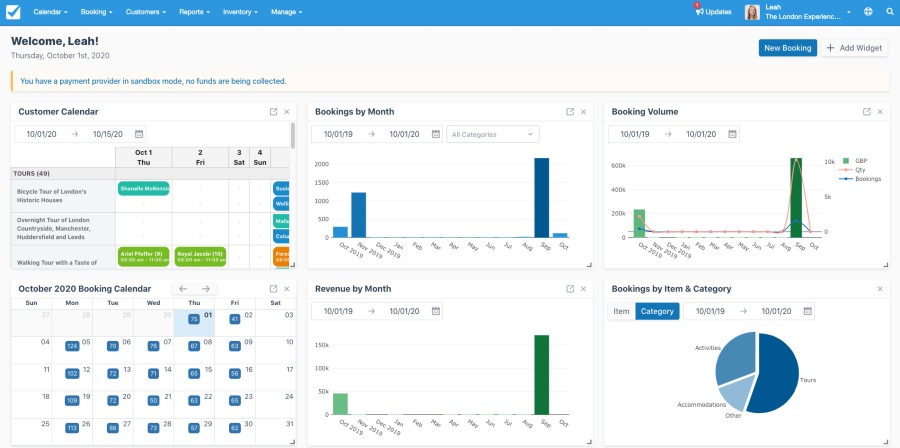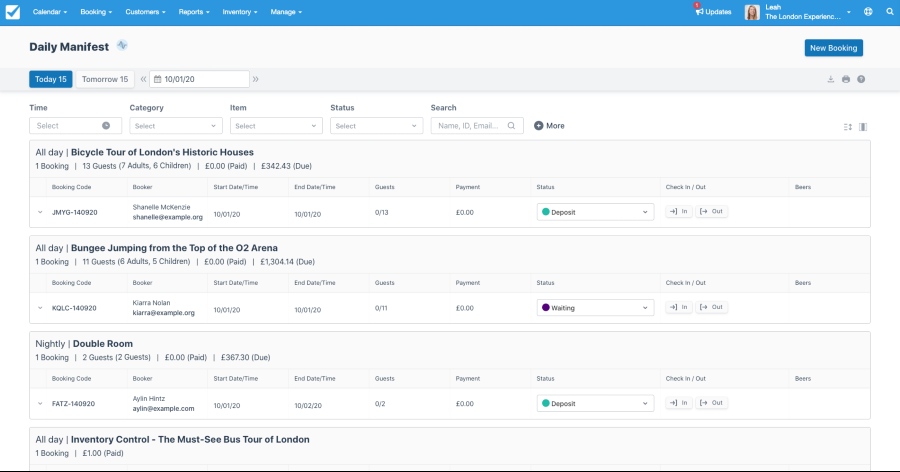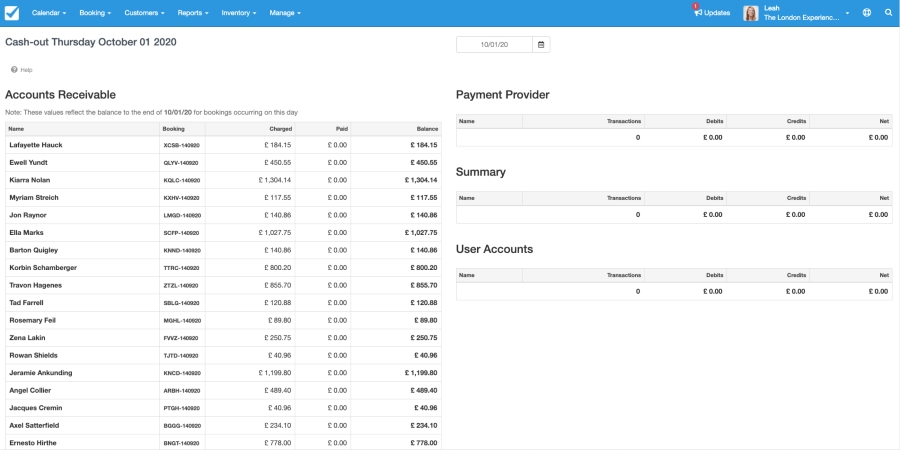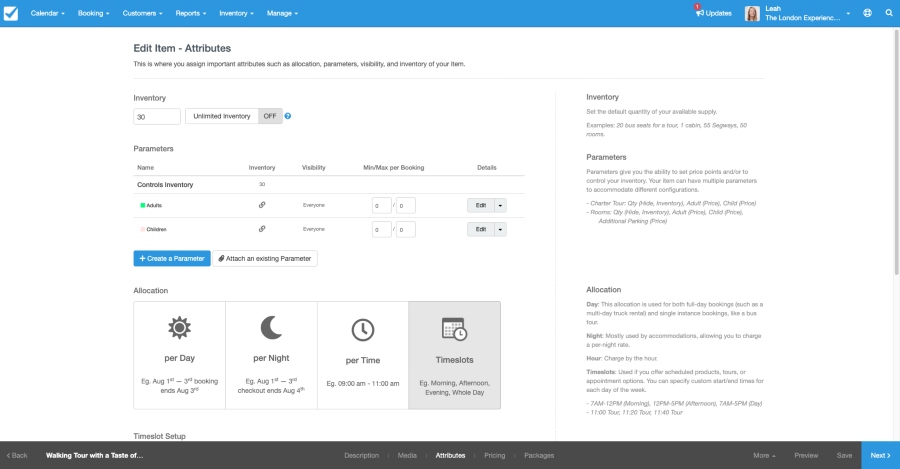An online booking system is a software solution that allows potential guests to self-book and pay through your website, and other channels, while giving you the best tools to run and scale your operation, all in one place.
But if your business has gotten far without an online booking system, you might think: do I even need one? Would I really use all the functionalities it has to offer? What’s with all the hype anyway? After all, you’re getting enough reservations already. Why bother taking on that extra expense?
Well, let me ask you this: is your email inbox a war zone? Does your phone ever stop ringing? Are you drowning in paper waivers and booking forms? Is your Excel booking system getting harder to understand with messy formulas and mistakes?
Case closed.

The purpose of an online booking system
A booking system can help you do way more than just passively accept bookings and payments online. Reservation technology (res-tech) has evolved to the point that it’s become a central hub for managing every aspect of your business, from marketing to distribution to operations.
Here are just a few things you can do:
- Track your growth with real-time reporting
- Avoid double bookings with channel management
- Keep track of your partnership commissions
- Assign inventory and staff to individual activities
- Gather details about your guests before they arrive
- Break down your day to day priorities
- Provide a complete management system
- The list goes on and on
But don’t just take my word for it. Before you adopt a new system, you should always consider if it’s right for your business. So, let’s quickly go over the pros and cons of an online booking system.

Advantages of an online booking system
1. Your business is always open
One of the biggest advantages of an online booking system is that, thanks to its many functionalities, you can stay open for business 24/7, no matter your hours of operation. Similar to how your website allows guests to find out more about your company without getting hold of a brochure, a reservation software makes it so they don’t have to wait until they can get a hold of you to reserve their spot.
Instead, they have the convenience to book on their own, when it’s right for them — on the train to work, while the water boils, or sitting in the airport doing last-minute trip planning. Which brings up a good point. If you serve mostly international travelers, many won’t have a phone plan in your country or the time to standby for an email reply.
In other words, an online booking system opens doors, rather than closing and locking them at the end of the day.

2. Offers more security than spreadsheets
With a cloud-based booking system, your business information will no longer be confined to a desktop computer. Although it seems strange to think of your data floating around in cyberspace, it’s actually a far more secure solution.
Think of it this way. A hard drive crash or computer virus can wipe your entire system, whereas online booking software relies on highly protected servers to safeguard your hard-earned sales. I’m not trying to scare you. It’s just the reality you shouldn’t ignore until it’s too late.
Plus, everything’s more accessible when it’s online. Just like travelers who can book on the go, you can run your business from anywhere, using a mobile app while out and about with guests or with your laptop when you want to keep tabs on how things are going while away on vacation.
3. Cuts your workload in half with the power of automation
Manual data entry may be your one chance a day to switch off your brain and listen to a podcast, but it always takes up more time than you expect, doesn’t it? Time you shouldn’t have to give up.
As a business owner, you don’t have to be chained to your desk. With automation, you can get home in time for dinner, spend weekends with your family, go on local adventures even on a Monday, and be the face of your business by meeting and greeting guests.
An online reservation system can help you save time by automating mundane tasks, whether it’s generating cash-out reports, or updating availability on every channel. It can even handle automated SMS and email reminders to ensure your guests never forget a reservation. Everything runs in the background, so you and your staff can focus on more important things – like your guests and maintaining a healthy work-life balance.
By embracing automation, you’re not just cutting your workload in half, you’re transforming the way you run your business and giving yourself the freedom to focus on what really matters.

4. Creates a better guest experience
Guests today expect instant gratification. Thanks to smartphones, they’ve been hardwired to believe that anything’s accessible in a matter of seconds. Meaning they’re usually impatient if they ever have to wait on a slow loading website, busy phone line, or neverending queue.
Reservation technology speeds everything up from booking to check-out. In just a few steps, guests can book, pay, and sign required documents while getting a confirmation in their inbox right away. And they rarely have to hear a “one moment please” upon arrival either, because check-in will be just a few clicks for your staff, too!
Not to mention, you can enhance the guest experience by adding personalization. Whether it’s using tokens in your automated emails, showcasing relevant add-ons during the booking process, or giving guests the freedom to customize the message and total amount on Gift Certificates.
5. Helps you stay organized
Let’s be real. Does it look like someone pranked your desk with sticky notes? Do you write everything down in a daily planner that’s only legible to you? Or worse, do you keep everything in your head and expect others to read your mind?
If your operation feels chaotic, on a good day, it might be time to get things in order. As mentioned, an online booking software is like a central hub. It stores all of your business information, including guest details, revenue, waivers, forms, invoices, inventory, staff, partners, and more.
Everything is in one place. All you have to do is log in and you’ll see a breakdown of your daily bookings, which guests still need to pay and sign, what inventory is available, and more. You can even leave notes for your staff on individual bookings so they’re always in the loop.

6. Prevents cancellations and no-shows
When someone books online, with or without a deposit, they’re more likely to feel on the hook to show up. And if they neglect to read your cancellation policy and let you know they can’t make it, you’ll already have their credit card details on hand so that you don’t lose money for a last-second empty seat.
Plus, with an online booking system, you can always set up automated reminder emails or text notifications to stay in a guest’s good graces because we’re all only human, and sometimes people simply forget.
7. Provides insight into your business
If creating reports makes you want to pull your hair out (we can all relate), why not let a program automatically create them for you, in real-time?
Since a booking system keeps track of every reservation and the details tied to it, you can see what products make you the most money, better understand who your typical guest is for targeting, and get a snapshot of your business trajectory. Analytics are all right there.

8. Integrates with your favorite software tools
Some business owners like using Quickbooks Online, whereas others prefer Xero. You might be a fan of ActiveCampaign rather than Mailchimp. For your website, you might rely on WordPress or another popular content management system like Wix. That’s okay. There’s a reason why you use the software tools you do. Your business is unique, and so, you probably have a particular way of doing things, a system that works well.
Here’s the thing. Booking software doesn’t have to throw it all out of whack, but rather, complement the processes you already have in place. Most booking solutions have popular integrations, plugins and tools you can use at your disposal to help grow your business and optimize your workflows.
9. Enhances your social media presence
An online booking system can greatly enhance your social media strategy and overall digital presence. By integrating your booking platform with your social media profiles, you can share direct links to your tours, activities or experiences.
Whether you’re promoting a seasonal package on Instagram or announcing last-minute availability on Facebook, your audience can book instantly with just a few taps. This seamless buying process not only improves conversion rates, but also capitalizes on impulse bookings, turning your social media presence into a powerful sales channel.

10. Streamlines payment processing
A booking software revolutionizes the way you handle online payments for your tours and activities. Whether your clients prefer to use credit cards or PayPal, a reservation system allows them to purchase your experiences with no hassle. This streamlined process not only improves the customer experience, but also increases your cash flow by enabling instant, automated transactions. In addition, by providing a smooth, secure shopping experience, you can build trust with your audience and potentially increase conversion rates.
Disadvantages of an online booking system
1. It takes time to set up
While it’s relatively easy to get a booking system up and running, you still need at least 24 hours for implementation. You might be eager to get things live ASAP, but it’s best to learn how to set up online reservations properly first. That way, you can get it right from the get-go rather than having to fix misconfigurations later.
Of course, there is a learning curve, but the best booking software company should provide you with all the support you need — as well as options for configuration assistance — to execute a successful launch.

2. You have to train your staff
After your booking system is set up, you have to show your staff, especially the front desk, how to use it. Fortunately, booking software is super user-friendly, especially once everything’s configured correctly. It can take as little as five minutes or an hour, depending on each individual’s role.
That said, it’s still downtime you have to account for, not just in the beginning, but for every new hire. However, you can always speed up this process with software training videos or checking if there are any recommendations on the fastest way to train staff on booking software.
Online booking system pricing
When choosing an online booking system for your tour or activity business, it’s important to understand the different pricing models and how they impact your bottom line. Let’s explore the common structures, industry standards and how Checkfront’s approach differs.
Common Pricing Models
In the res-tech industry, you’ll often encounter two primary pricing structures:
- Hybrid approach: This model combines a fixed monthly subscription fee with a small per-booking commission.
- Transaction-based model: This structure eliminates the monthly subscription fee, but typically has a higher per-booking commission.
Many online booking systems in the tour and activity industry operate on a model that charges around 6% per transaction. This high percentage can have a significant impact on your margins, especially as your business grows and handles more reservations.

The Checkfront difference
Checkfront has taken a more operator-friendly approach:
- 3% fee on online bookings: Checkfront charges only 3% per transaction for online bookings, half the industry average. This fee structure applies to both direct bookings through your website and those coming from Online Travel Agencies (OTAs).
- No fee for offline bookings: Importantly, Checkfront doesn’t charge for offline bookings, such as phone or in-person reservations.
By offering a 3% fee on online bookings—half the industry standard—and no charges on offline bookings, Checkfront provides a cost-effective solution that supports your business growth while maximizing your revenue retention. This approach allows you to leverage the benefits of an advanced online booking system without the hefty price tag often associated with such services.
So, is an online booking system worth it?
Nowadays, the question isn’t really whether an online booking system is worth it, but rather how long can your business survive without one? From streamlining your scheduling process to managing customer data through an integrated CRM, the benefits are clear and powerful.
Sure, setting up a new system and training staff may seem time-consuming at first. But consider the hours you’ll save in the long run by automating your back-end operations, reducing manual data entry, and minimizing scheduling conflicts. Your booking site works tirelessly around the clock, extending your business hours without extending your workday.

With features like embeddable widgets for your website, seamless email marketing integration, and the ability to collect valuable customer data, an online booking system isn’t just a convenience – it’s a powerful tool for growth. It frees you and your staff from mundane tasks, allowing you to focus on what really matters: creating exceptional experiences for your guests.
At Checkfront, we understand the unique needs of tour operators and activity providers. Our system is designed to complement your existing workflow while opening new avenues for growth. With our competitive 3% fee on online bookings – half the industry standard – and no fees on offline bookings, we offer a cost-effective solution that scales with your business.
Are you ready to revolutionize your booking process and take your business to the next level? Book a demo with Checkfront today and discover how our online booking system can transform your operations, improve your guest experience, and boost your bottom line.
Want to find out more about online booking systems?

Take your business to the next level
Online bookings. Flexible pricing. Outstanding support.
Next Chapter: How Does An Online Booking System Work?



